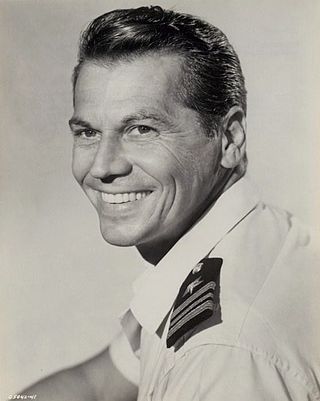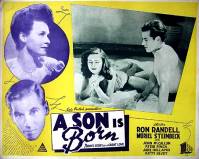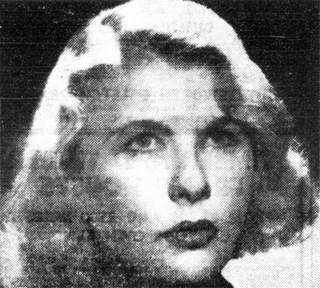Related Research Articles

Ronald Egan Randell was an Australian actor. After beginning his acting career on the stage in 1937, he played Charles Kingsford Smith in the film Smithy (1946). He also had roles in Bulldog Drummond at Bay (1947), Kiss Me Kate (1953), I Am a Camera (1955), Most Dangerous Man Alive (1961) and King of Kings (1961).

Ronald Grant Taylor was an English-Australian actor best known as the abrasive General Henderson in the Gerry Anderson science fiction series UFO and for his lead role in Forty Thousand Horsemen (1940).
Sumner Locke Elliott was an Australian novelist and playwright.
Rusty Bugles was a controversial Australian play written by Sumner Locke Elliott in 1948. It toured extensively throughout Australia between 1948–1949 and was threatened with closure by the New South Wales Chief Secretary's Office for obscenity.
Bruce Robert Stewart was an actor and scriptwriter best known for his scripts for television. Originally from New Zealand, he lived for several years in Australia, working in the theatre, before moving to the United Kingdom in the early 1960s. There he worked on many projects for both the BBC and ITV, notably Out of the Unknown and Timeslip.

A Son Is Born is a 1946 Australian melodrama directed by Eric Porter and starring Ron Randell, Peter Finch, John McCallum and Muriel Steinbeck. It was one of the few films made in Australia in the 1940s. The movie is particularly notable for featuring Randell, Finch and McCallum before they moved overseas and became stars in the United States and Britain respectively.

Muriel Myee Steinbeck was an Australian actress who worked extensively in radio, theatre, television and film. She is best known for her film performance portraying the wife of aviator Sir Charles Kingsford Smith in Smithy (1946) and for playing the lead role in Autumn Affair (1958–59), Australia's first television soap opera.

Blue Murder is an Australian live television play which aired in 1959 on ABC. Broadcast live in Sydney on 2 December 1959, a kinescope ("telerecording") was made of the broadcast so it could be shown in Melbourne.
Funnel Web is a 1962 Australian TV play starring Grant Taylor and written by Phillip Grenville Mann. It screened on the ABC and was a suspense drama.
Swamp Creatures is a play by the Australian author Alan Seymour. He wrote it for radio, stage and TV. It was Seymour's first produced play.
The Concord of Sweet Sounds is a 1963 Australian television play starring Stuart Wagstaff, directed by Henri Safran and written by Patricia Hooker. Henry Gilbert played a musical genius. Australian TV drama was relatively rare at the time.
"Tartuffe" is a 1965 Australian television film directed by Henri Safran and starring Tony Bonner and Ron Haddrick. It was an episode of Wednesday Theatre and filmed in Sydney at ABC's Gore Hill Studios. It aired on 13 October 1965 in Sydney and Melbourne, and on 20 October 1965 in Brisbane.
"The Mystery of a Hansom Cab" is a 1961 Australian television drama play based on Barry Pree's 1961 play adaptation of the novel by Fergus Hume. It appeared as an episode of the anthology series The General Motors Hour. It aired on 6 August 1961 in Sydney and on 19 August 1961 in Melbourne.
Alan Burke was an Australian writer and film director and producer. His credits include the musical Lola Montez.
The Sub-Editor's Room is a 1956 Australian television play. It was produced and written by Leslie Rees. It was the first Australian-written television drama to air on Australian television.

Lyndall Harvey Barbour was an Australian actress, primarily of radio, although she also added stage and television work to her repertoire. Born in Egypt to Australian parents, she was a three time recipient of the Macquarie Radio Network award.
The First Joanna is a 1943 play by Dorothy Blewett that was adapted for radio and television.
"Done Away With It" is the 16th television play episode of the first season of the Australian anthology television series Australian Playhouse. "Done Away With It" was written by Pat Flower and directed by Henri Safran and originally aired on ABC on 1 August 1966.
Quiet Night is a 1941 Australian play by Dorothy Blewett.
The Crater is a 1948 Australian radio play by Sumner Locke Elliot that was later adapted for American television.
References
- ↑ Vagg, Stephen (September 11, 2022). "Forgotten Australian TV Plays: Australia on US TV – Sumner Locke Elliott's Wicked is the Vine and The Crater". Filmink.
- ↑ "AUSTRALIAN PENS LUX PLAY". The Examiner . Launceston, Tasmania. 9 August 1947. p. 1 Section: The EXAMINER WEEK–END MAGAZINE SECTION. Retrieved 24 March 2013– via National Library of Australia.
- ↑ "George Hart's Radio Round-Up". The Sun . No. 11, 704 (LATE FINAL EXTRA ed.). Sydney. 31 July 1947. p. 6. Retrieved 18 July 2017– via National Library of Australia.
- ↑ "THIS WEEK'S RADIO REVIEW Listeners do a little solid hating". The Argus . No. 31, 494. Melbourne. 9 August 1947. p. 43. Retrieved 18 July 2017– via National Library of Australia.
- ↑ "ON THE AIR". Smith's Weekly . Vol. XXIX, no. 25. New South Wales. 16 August 1947. p. 20. Retrieved 18 July 2017– via National Library of Australia.
- ↑ "GEORGE HART'S RADIO NEWS". The Sun . No. 12, 173 (LATE FINAL EXTRA ed.). Sydney. 1 February 1949. p. 10. Retrieved 18 July 2017– via National Library of Australia.
- ↑ "Australian Play To Be Televised". The Sydney Morning Herald . 27 October 1948. p. 1. Retrieved 24 March 2013– via National Library of Australia.
- ↑ "Australians In Television". The Sunday Herald . Sydney. 19 June 1949. p. 8 Supplement: Features. Retrieved 24 March 2013– via National Library of Australia.
- ↑ "Bugles offered Broadway". Variety. 3 November 1948. p. 13.
- ↑ Kraft Television Theatre Season 2 at CTVA
- ↑ "Australians In Television". The Sunday Herald . No. 22. Sydney. 19 June 1949. p. 8 (Features). Retrieved 18 July 2017– via National Library of Australia.
- ↑ "MUSIC AND THE THEATRE "Radio Is Doomed"As "Rusty Bugles" Author Sees It". The Sunday Herald . No. 50. Sydney. 8 January 1950. p. 6 (Features). Retrieved 18 July 2017– via National Library of Australia.
- ↑ Vagg, Stephen (August 10, 2019). "Unsung Aussie Actors – Ron Randell: A Top Twenty". Filmink.
- ↑ "American TV play at the Torch". The Kensington News and West London Times. 6 November 1953. p. 2.
- ↑ "Wicked is the Vine". The Kensington News and West London Times. 20 November 1953. p. 2.